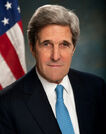| ‹ 2008 | ||||
| United States presidential election, 2012 | ||||
|---|---|---|---|---|
| November 6, 2012 | ||||

|

|

| ||
| Nominee | John Kerry | Jeb Bush | Ron Paul | |
| Party | Democratic | Republican | Independent | |
| Home state | Massachusetts | Florida | Texas | |
| Running mate | Barack Obama | Susana Martinez | Dennis Kucinich | |
| Electoral vote | 326 | 206 | 7 | |
| States carried | 25+DC | 24 | 1 | |
| Percentage | 44.9% | 35.1% | 18.3% | |
The United States presidential election of 2012 was the 56th quadrennial presidential election, held on Tuesday, November 6, 2012. Democratic Party nominee President John Kerry and his running mate, Vice President Barack Obama, defeated Republican nominee former Vice President Jeb Bush and his running mate, Governor Susana Martinez, as well as independent nominee Rep. Ron Paul and his running mate, Rep. Dennis Kucinich, in the general election. Gov. Martinez was the second woman (first being Democrat Geraldine Ferraro in 1984) and first Latina to be nominated on a major party's presidential ticket; former Vice President Bush was the first presidential nominee to be in an interracial marriage. Rep. Paul's independent campaign was the most successful campaign of its kind since Ross Perot's in 1992, and the first to win any state in the general election since George Wallace in 1968.
President Kerry went into the election fairly popular, but not without criticism. The economic recovery was slow, but the end of the War in Afghanistan in late 2011 had proved extremely popular. He suffered no significant primary opposition, and his nomination was never in doubt.
The Republican Party, on the other hand, was in a state of chaos for most of Kerry's first term. After twelve years in the White House, the GOP leadership concentrated hard on how to get it back, and the nominating contest was brutal. The frontrunner was the extremely popular Secretary of Defense John McCain, who had stayed on during the Kerry Administration. McCain, the subject of speculation since at least 2009, gave a blistering speech in early 2010, castigating those urging his candidacy, and announcing that he would not only not run, but he had left the Republican Party, and would spend the rest of his career politically independent. Sorely wounded from this blow, the GOP had a wide-open primary. Most of the speculation was on former Texas Governor George W. Bush; his younger brother, former Vice President Jeb Bush, was seen as hesitant to take the mantle. Gov. Bush ultimately declined, and endorsed his brother, who, true to form, reluctantly entered the race in April 2011. Other top contenders for the nomination included libertarian Texas Rep. Ron Paul, Georgia Senator Newt Gingrich, former Minnesota Governor Tim Pawlenty, former Massachusetts Governor Mitt Romney, and Minnesota Rep. Michele Bachmann. By March 2012, however, it was clear that Bush was the frontrunner, and every candidate except Rep. Paul fell into place behind him by Super Tuesday.
Rep. Paul, who ultimately came second in the Republican primary, staged a protest outside of the GOP convention, demanding that his delegates be seated. When the party establishment refused, Paul dramatically announced, on the steps outside the convention center in Tampa, Florida, that he would run as an independent, and challenge both parties on an antiwar and anti-government overreach platform. He immediately took a commanding place in the polls, even leading in several states. On September 3rd, he announced Democratic Oregon Sen. Ron Wyden as his running mate, shocking many in his core libertarian constituency, but opening up his campaign to many others who might be sympathetic to his civil libertarianism and somewhat more skeptical of his fiscal views.
Rep. Paul, polling above 40% in several key states by October, was ultimately allowed into the debates, as was Sen. Wyden into the vice presidential debate. Although Wyden was seen as the winner of the debate he took part in, observers generally saw Paul's performance as lacking, compared to his more experienced opponents. On election day, Paul's insurgent campaign managed nearly 20% of the vote, and even succeeded in winning the delegates to Sen. Wyden's home state of Oregon. President Kerry would ultimately win reelection, however.
